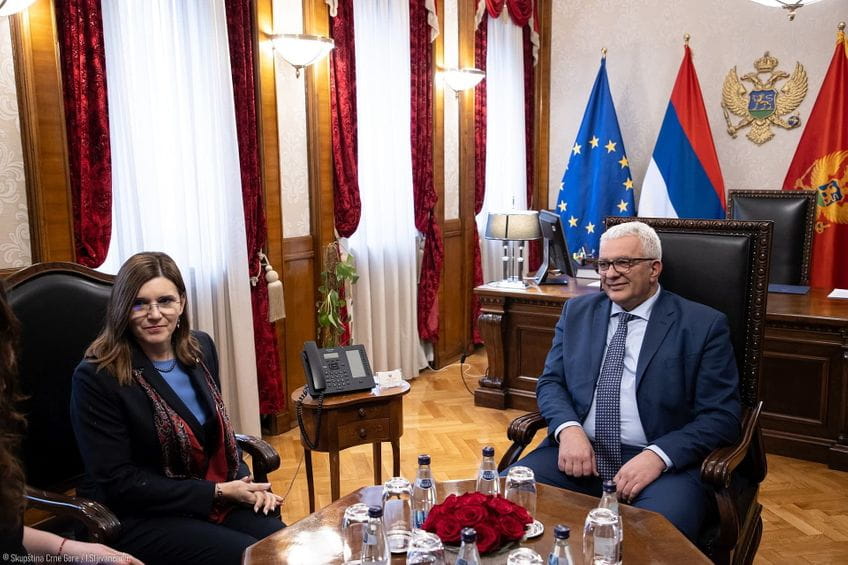The recent meeting between Ambassador Kristina Oana Popa, Head of the EU Delegation in Podgorica, and Andrija Mandić, President of the Montenegrin Parliament and President of the New Serbian Democracy (NSD) attracted a lot of attention from the Montenegrin public.
The reason for this was the tricolor Serbian flag, the so-called “national Serbian flag”, which, under that name and in that appearance/colors, exists only in Serbia and Republika Srpska.
Discussions about that illegal in Montenegro flag, which Mr. Mandić wants, on the one hand, to emphasize his dimension of the “representative of the Serbian people in Montenegro”, and, on the other hand, to continue the policy of marginalization of Montenegrin national and state symbols, covered the central question related to that meeting: why it happened and what are the its repercussions?
Diplomats of European Union countries, just like their American colleagues, in the period after the June extraordinary elections, insisted, both in public occasions and during diplomatic communications, that pro-Russian and (therefore) pro-Serbian politicians and parties should not be part of the new , 44th Montenegrin Government. That pressure was not enough. Both President Milatović and Prime Minister Spajić ignored the calls from the West. Andrija Mandić became the President of the Parliament, in a way that showed the dependence of the Europe Now Movement on his support for the formation of the Government. On top of that – a “reconstruction”/reshuffling of the Government was planned – which should take place during this year – in which some ministerial positions would be occupied by representatives of the coalition led by NSD and Andrija Mandić.
European and American diplomats avoided meetings and communication with Mr. Mandić. Exceptions were rare and mostly less relevant – except for the meeting that took place in Budapest, during the meeting of the presidents of the Western Balkan parliaments, when Oliver Varhelji, the controversial European commissioner for good neighborly relations and enlargement had a meeting (officially: courteous) with Mr. Mandić. Since then, there has been no official public communication with the pro-Russian speaker of the Montenegrin Parliament.
That is why the visit of Ambassador Popa opens up a whole series of questions.
It is clear that her move is not an expression of her personal preference, ie. independent decision. The Romanian diplomat – who cannot avoid criticism for her very mild and permissive policy towards the authorities from August 2020 until now – could not dare to do such an act without a clear signal from Brussels. (It is difficult, in this sense, to determine the exact address from which the instruction for the meeting could have arrived, but it is less likely that Mr. Varhelji has the power to make such a decision himself.)
Communication of the EU ambassador with Mr. Mandić should therefore be interpreted primarily as an examination of the possibilities – by Brussels – of the ways and methods of conducting as much constructive and sustainable communication with pro-Russian parties in Montenegrin politics as possible. On the other hand, many analysts see it as a decision, i.e. as opening the possibility for a definitive decision, which would mean the continuation of the policy of giving in and pandering to pro-Russian and pro-Serbian elements in Montenegro and the Western Balkans. In this type of interpretation, it is inevitable to connect with the situation in Serbia and the position of Aleksandar Vučić, whose main (and, should we say, most obedient) ally in Montenegro is precisely Mr. Mandic. That dimension of such a European move should by no means be excluded from the analysis.
The fact is that such a “policy of tolerance”, i.e. tacit but clear support for an open pro-Russian policy in Montenegro, diminishes Montenegrin’s chances for quick accession to the EU. Rhetoric will remain optimistic – which was, after all, the statement of Ambassador Popa’s cabinet. “Montenegro needs to work hard and progress, all doors are open, reforms are expected, in which the Parliament should also participate …”
Behind that optimism lies the very complex internal situation in Montenegro, but also the EU’s unwillingness to take decisive steps that would really bring the smallest candidate for EU membership closer to that distant goal.
On the Montenegrin side of the story is the Europe Now Movement, headed by the opposing party president Spajić and his vice-president Milatović. Their ideological determinants are, in fact, very close to those shared by Mandić. The difference is dominantly in rhetoric, while Prime Minister Spajić must not forget his lack of interest in politics, i.e. unwillingness to advertise on political topics. Which only makes his obsession with financial and economic topics less credible.
On the European side, there is a variety of attitudes and interpretations – which differ from country to country – but which, as their resultant in Brussels, give an inert and ineffective policy towards Montenegro and the countries of the Western Balkans.
That is why the communication of Madam Ambassador and Mr. Speaker is an announcement of the continuation of that inertia and bad news – both for Montenegro and for Europe.
If, therefore, there is a European turn – it is directed in the wrong direction.
Miodrag Vlahović



